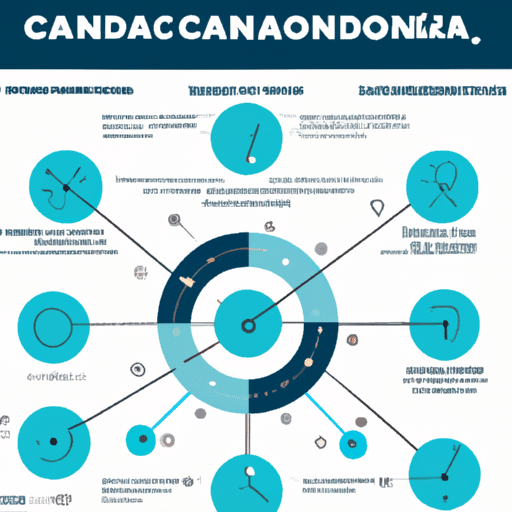The blog post provides an in-depth look at Cardano, the revolutionary third-generation blockchain technology, and its global implications. It delves into the specifics of Cardano, its unique features, and how it is being used worldwide in various sectors such as finance, healthcare, and education.
Understanding Cardano: What exactly is it?
Cardano is a decentralized blockchain platform that aims to provide a secure and scalable infrastructure for the development of decentralized applications (DApps) and smart contracts. It was created by a team of engineers, mathematicians, and cryptographers, with the main objective of addressing the limitations and challenges faced by existing blockchain networks.
Unlike traditional cryptocurrencies like Bitcoin and Ethereum, Cardano utilizes a unique proof-of-stake consensus algorithm called Ouroboros. This algorithm ensures the security and reliability of the network by allowing users to participate in the consensus process based on the number of ADA (Cardano’s native cryptocurrency) they hold. This approach not only reduces energy consumption but also increases the scalability of the network.
One of the key features of Cardano is its multi-layered architecture.
It consists of two distinct layers: the Cardano Settlement Layer (CSL) and the Cardano Computation Layer (CCL). The CSL handles the transfer of ADA between users, while the CCL is responsible for executing smart contracts and running decentralized applications. This separation of layers allows for better security, flexibility, and interoperability.
Furthermore, Cardano is designed with a strong focus on research and academic collaboration. The project is developed using a rigorous scientific approach, with regular peer-reviewed research papers and a transparent decision-making process. This scientific foundation ensures that the platform is built on solid principles and can adapt to future advancements in the field.

A graphic illustration of the Cardano logo with a globe in the background
How does Cardano differentiate itself from other cryptocurrencies?
Cardano sets itself apart from other cryptocurrencies in several key ways. Firstly, its use of the Ouroboros proof-of-stake consensus algorithm distinguishes it from traditional proof-of-work systems like Bitcoin. Ouroboros not only reduces energy consumption but also allows for faster transaction processing and increased scalability. This makes Cardano more environmentally friendly and capable of handling a larger volume of transactions.
Secondly, Cardano’s multi-layered architecture is another factor that differentiates it from other cryptocurrencies. The separation of the settlement and computation layers provides added flexibility, security, and interoperability. This architecture allows for updates and improvements to be made to the network without disrupting the core functionality, making Cardano more adaptable to future advancements.
Furthermore, Cardano’s scientific approach to development and decision-making sets it apart from many other cryptocurrencies. The project is grounded in peer-reviewed research papers and involves collaboration with academic institutions. This emphasis on scientific rigor ensures that Cardano is built on solid principles and can withstand scrutiny in terms of security and scalability.
Finally, Cardano’s focus on global inclusion and interoperability is another distinguishing factor. The project aims to enable the seamless transfer of value across different blockchains, making it easier for users to interact with various decentralized applications. This interoperability sets Cardano apart as a platform that seeks to bridge the gap between different blockchain ecosystems.
“Is Cardano truly a game-changer?” – Exploring its Unique Features
Cardano’s unique features have positioned it as a potential game-changer in the world of cryptocurrencies. Let’s delve into three key aspects that make Cardano stand out.
- 1. Scalability and Sustainability:
One of Cardano’s standout features is its focus on scalability and sustainability. Through its layered architecture and Proof-of-Stake consensus algorithm, Cardano aims to address the scalability challenges that have plagued other cryptocurrencies. By separating the settlement and computation layers, Cardano can handle a higher volume of transactions without compromising security or efficiency. Additionally, its energy-efficient approach reduces the environmental impact typically associated with cryptocurrency mining, making it a more sustainable option for the future. - 2. Smart Contract Functionality:
Cardano’s development team has placed a strong emphasis on building a robust smart contract platform. By incorporating a programming language called Plutus, Cardano enables the creation of complex and secure smart contracts. Plutus allows developers to write smart contracts in a functional programming language, which provides greater reliability, security, and flexibility. This unique feature positions Cardano as a viable platform for decentralized applications (dApps) that require advanced smart contract capabilities. - 3. Governance and Decentralization:
Cardano aims to establish a decentralized governance model that empowers its community members to participate in decision-making processes. Through its native token, ADA, holders have the ability to vote on proposals and influence the direction of the platform. This approach ensures that Cardano evolves in a decentralized and inclusive manner, reducing the influence of a single entity or centralized authority. By emphasizing governance and decentralization, Cardano strives to create a more democratic and resilient blockchain ecosystem.

An infographic depicting the unique features of Cardano
Global Adoption of Cardano: Who’s using it and how?
Cardano’s global adoption is steadily increasing as more individuals, organizations, and governments recognize its potential. Several prominent entities have started utilizing Cardano for various purposes, showcasing its versatility and real-world applicability.
Firstly, the Ethiopian government has embraced Cardano to develop a blockchain-based solution for its agricultural sector. By leveraging Cardano’s technology, the government aims to enhance supply chain transparency, traceability, and efficiency, ultimately benefiting local farmers and consumers.
In the education sector, the University of Wyoming has partnered with IOHK, the development company behind Cardano, to explore the use of blockchain technology in academic certifications. This collaboration aims to create a tamper-proof and verifiable system for issuing and storing digital credentials, reducing fraud and increasing trust in academic achievements.
Furthermore, Emurgo, one of the founding entities of Cardano, has been actively working on expanding its global adoption. Emurgo has established partnerships with various companies, including healthcare providers, retail businesses, and financial institutions, to integrate Cardano’s blockchain into their operations. These partnerships seek to leverage Cardano’s capabilities to improve data security, streamline processes, and enhance customer experiences.
Additionally, Cardano has gained traction in the decentralized finance (DeFi) space. Several DeFi platforms, such as Liqwid Finance and Minswap, are built on Cardano’s blockchain, offering users decentralized lending, borrowing, and trading services. This demonstrates the growing interest in Cardano as a platform for decentralized financial applications.
Cardano has clearly emerged as a disruptive technology, challenging the traditional norms in numerous sectors across the globe. While still in its early stages, it already shows great promise in revolutionizing the way we handle and share data. The world’s adoption of Cardano is a testament to the potential of blockchain, reiterating that we are indeed in the dawn of a new digital era.
